Seven Engineering Grad Students Earn NSF Research Fellowships
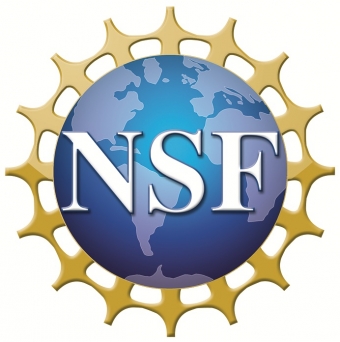 The National Science Foundation has granted seven UC Irvine engineering graduate students a research fellowship. The NSF Graduate Research Fellowship Program (GRFP) recognizes and supports outstanding graduate students in science, technology, engineering and mathematics disciplines.
The National Science Foundation has granted seven UC Irvine engineering graduate students a research fellowship. The NSF Graduate Research Fellowship Program (GRFP) recognizes and supports outstanding graduate students in science, technology, engineering and mathematics disciplines.
"The School of Engineering is thrilled that such dedicated and talented students have chosen UCI for their graduate work - these awards recognize years of consistent and exceptional effort,” says Lee Swindlehurst, associate dean for research and graduate studies. “The number of awards the school received this year is a strong indicator of both the quality of our graduate student body and the hard work of our faculty in focused recruiting of top-tier domestic students."
Across campus, 37 students won fellowships this year, putting UCI ninth in the nation and tied for second within the University of California system for the prestigious awards. Here are the Samueli School’s 2014 fellowship awardees.
 Tyler Abercrombie is a second-year graduate student in environmental engineering. Under the mentorship of Professor Sunny Jiang, Abercrombie is researching microbial responses to chlorination-dechlorination as a pretreatment to reverse osmosis membrane desalination (the removal of salt from saline water to generate drinking water).
Tyler Abercrombie is a second-year graduate student in environmental engineering. Under the mentorship of Professor Sunny Jiang, Abercrombie is researching microbial responses to chlorination-dechlorination as a pretreatment to reverse osmosis membrane desalination (the removal of salt from saline water to generate drinking water).
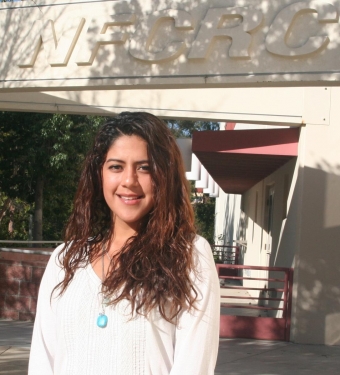 Analy Castillo is an environmental engineering doctoral student, working in the Advanced Power and Energy Program. Under the guidance of Professor Scott Samuelsen, Castillo is examining the deployment of hydrogen fuel cell buses in public transportation systems. She is developing an analysis and planning methodology that will help identify a preferred hydrogen infrastructure roll-out scenario.
Analy Castillo is an environmental engineering doctoral student, working in the Advanced Power and Energy Program. Under the guidance of Professor Scott Samuelsen, Castillo is examining the deployment of hydrogen fuel cell buses in public transportation systems. She is developing an analysis and planning methodology that will help identify a preferred hydrogen infrastructure roll-out scenario.
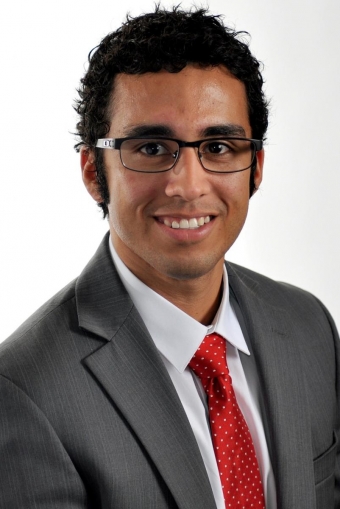 Adrian Garcia is a materials science graduate student working with Associate Professor Regina Ragan. His research focuses on the control of graphene layers through metal alloys onto interesting substrates. This is an integral component of the next generation of high-energy density super-capacitors, carbon micro-electromechanical devices, and graphene applications in general.
Adrian Garcia is a materials science graduate student working with Associate Professor Regina Ragan. His research focuses on the control of graphene layers through metal alloys onto interesting substrates. This is an integral component of the next generation of high-energy density super-capacitors, carbon micro-electromechanical devices, and graphene applications in general.
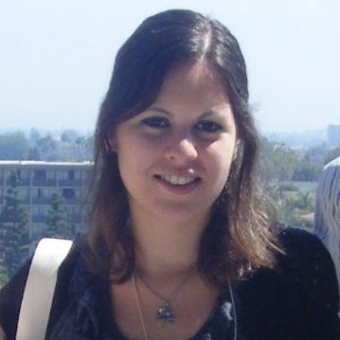 Vanessa Herrera is a first-year biomedical engineering graduate student working with Professor Abraham Lee. Herrera’s research involves designing and developing single cell trapping devices using microfluidic principles. The device has the capability to isolate and release individual cells for further analysis and processing.
Vanessa Herrera is a first-year biomedical engineering graduate student working with Professor Abraham Lee. Herrera’s research involves designing and developing single cell trapping devices using microfluidic principles. The device has the capability to isolate and release individual cells for further analysis and processing.
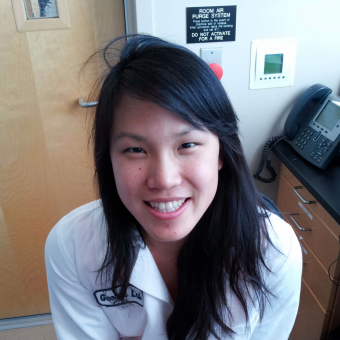 Sandra Lam is a biomedical engineering doctoral student working with Professor Steven George. Her research focuses on using microfluidic technology to engineer perfused micro-tissues. This research can also be used as a platform for high throughput drug studies.
Sandra Lam is a biomedical engineering doctoral student working with Professor Steven George. Her research focuses on using microfluidic technology to engineer perfused micro-tissues. This research can also be used as a platform for high throughput drug studies.
N icole Mendoza is a first-year biomedical engineering graduate student working with Associate Professor Michelle Khine. Mendoza’s research uses machine-learning algorithms to predict drug response in stem cell-derived cardiac cells. She hopes this work will translate into a more sensitive preclinical drug-screening platform for detection of cardiac toxicity.
icole Mendoza is a first-year biomedical engineering graduate student working with Associate Professor Michelle Khine. Mendoza’s research uses machine-learning algorithms to predict drug response in stem cell-derived cardiac cells. She hopes this work will translate into a more sensitive preclinical drug-screening platform for detection of cardiac toxicity.
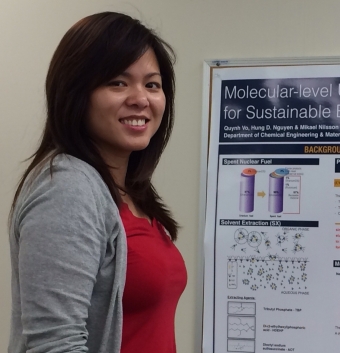 Quynh Vo is a second-year graduate student in chemical engineering and materials science working in the labs of two assistant professors, Hung Nguyen and Mikael Nilsson. Vo’s research uses molecular dynamics simulations in conjunction with experimental work to clarify the processes involved in solvent extraction systems. This could improve extraction efficiency and eliminate the toxic third-phase formation that occurs during the process of extracting useable materials and separating radioactive materials from spent nuclear fuel.
Quynh Vo is a second-year graduate student in chemical engineering and materials science working in the labs of two assistant professors, Hung Nguyen and Mikael Nilsson. Vo’s research uses molecular dynamics simulations in conjunction with experimental work to clarify the processes involved in solvent extraction systems. This could improve extraction efficiency and eliminate the toxic third-phase formation that occurs during the process of extracting useable materials and separating radioactive materials from spent nuclear fuel.
Three biomedical engineering graduate students received honorable mentions: Alex Javanpour, Jessica Hsieh and Eugene Lee.
